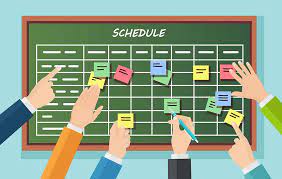September 15, 2022|י"ט אלול ה' אלפים תשפ"ב Does Your Schedule Reflect Your Priorities?
Print Article
Here’s a simple test to see if what you claim are the most important relationships, people and activities in your life, are actually priorities in your life. Pull out your calendar and review your typical day, week or month. Does your schedule reflect your priorities? Our real values are communicated in our schedule and what our calendar says is often frightening. Your calendar never lies. You can’t say one thing and schedule another. Where you spend your discretionary time is where your values are. What you make time for shows what matters to you.
Stephen Covey, author of the Seven Habits of Highly Effective People, writes, “The main thing is to keep the main thing the main thing.” We talk about our family being the main thing in our lives, or our Judaism, or some other value. But do we keep the main thing the main thing, or does what was supposedly the main thing become just another thing? If you want to know the answer, look at your schedule or calendar and see how much time you allocate to the “main thing,” or if the “main thing” even appears on your calendar at all. Covey captured this well elsewhere when he wrote, “The key is not to prioritize your schedule, but to schedule your priorities.”
There are many things that legitimately take us away from the “main things” of our lives. We can’t spend time with our children or expanding our minds or nourishing our souls when we are working, or shopping, or cooking. But what about when we aren’t, how do we use that time? Is it filled with meaning, or meaningless activities? Do we fill out our schedule with a purpose or is time taken up with purposelessness? Are we in control of our schedules, or are our schedules controlling us?
At the beginning of the Parsha, the Torah describes how the farmer would bring his Bikkurim, his first fruit to Yerushalayim. When presenting them, he would recite the Mikra Bikkurim, which included a short history of our people. In that context he would describe how, when we were slaves in Egypt, “We cried to Hashem, the God of our fathers, and Hashem heard our anyeinu, amaleinu and lachatzeinu.” These words are familiar to us both from the Parsha and from the Haggadah. But what are these words of suffering we describe?
Anyeinu is personal, internal anguish. The Egyptians purposely separated husbands and wives to create loneliness and pain. Amaleinu is hard work. The Egyptians had a strategy to literally break our backs with endless toil. What is lachatzeinu? Lachatz, still today in modern Hebrew, means pressure. The Egyptians applied enormous pressure in an effort to break us. What was that pressure? Our rabbis explain the Egyptians filled our time, occupied and preoccupied us, denied us the ability to even catch our breath. The greatest pressure is a packed schedule with no margin, no down time, no room to think, to experience, or to dream.
We may not have Egyptian oppressors but we, too, are captives to busyness, to our “crazy” schedules, to noble and ignoble tasks and activities that pull us in so many directions and deny us the chance to even breathe, to live, to experience, to dream. It is up to us to take control, to make the main thing the main thing, to have our schedules reflect our values.
Greg McKeown, the author of Essentialism, says, “If you don’t prioritize your life, someone else will.” Having our breakthrough year, our best year yet, begins with prioritizing our own lives.






